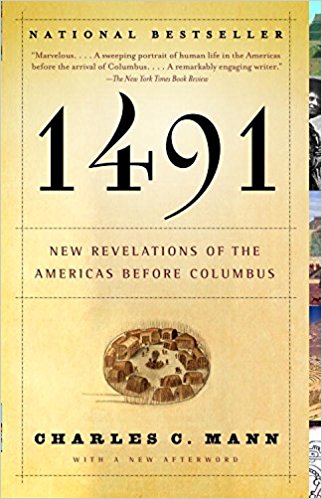Review: 1491 New Revelations of the Americas Before Columbus

This is a fascinating book that is written by Charles Mann about the subject of the civilizations that may have existed in the New World before the Europeans crossed the ocean. One aspect that I really enjoyed was the time and pages he devoted to discussing alternative points of view. Too frequently books have a thesis they try to prove and never discuss the counter points. Discussing the opposing arguments makes the book stronger and also serves to show how over time we have learned more and built on our past knowledge.
I think that there were two main things that really stood out to me in this book. The first is simply how much we have lost in knowledge and humanity due to the massive population loss. If you take this books arguments seriously, then it's as if we had never heard of half or more of the world's primitive culture that existed. It's truly shocking that all of these societies were temporally so close to us and we have managed to overlook them. One example that is particularly striking is Maya calender. It shows such advanced learning and knowledge in both mathematical and astrological areas. That isn't a cherry picked example however, Mann mentions almost half a dozen civilizations that we appear to have lost or forgotten that had interesting parallel discoveries.
It will make you even more upset then to read about and understand what early colonizers did to erase that history. It's also scary though, it show that human culture is so temporary and that maybe the long arc of the world is a cyclical one and not one of ever increasing human progress.
The second thing that really stood out to me in this book was the level of active management of the land. It's interesting how often we imagine the earth begin as this untouched virgin wilderness before Columbus but that's not really true at all. The individuals who lived though out the Americans had done massive large scale terraforming and shaping of the land to make it more habitable. This is a stark contrast to what most U.S. based education or even some environmental politics will teach.
If this is true, then this is cause for reevaluating some of the ecological policy. Often individuals in support of the environmental will appeal to the fact that the Americas used to be untouched wilderness and that settlers were a disruption to it. They further continue that we should make attempts to preserve or restore this utopia vision of American wilderness. However what this book posits is that what European colonizers saw was actually saw was the result of active land management programs by the Native Americans. In this case, how can we argue to return to such a state if that state is no more natural then our current one?
I think in some cases, this is actually a benefit to those arguing for ecological changes or management. One weakness in arguing that we should return to a pristine virgin state is that it simply isn't possible. After all, we aren't going to tear down New York City to restore the wilderness. So even proponents of this view have already granted that it isn't possible. So then what is actually the end state that is being argued for in that situation?
In the other case, if we view the Americas have been actively managed for hundreds or even thousands of years. This is a much better basis to argue that we are being irresponsible stewards and that we need to take seriously an active management mindset towards the land. After all, what would such an effort look like? If we grant that the mature forests present on colonization were the result of land management, then perhaps it's also okay to examine the belief that forest ecosystem are the pinnacle of conservation. I think having an honest conversation about this implications would be incredible valuable to the governments and the people that live on this land.
Overall this book was interesting and very dense. It does prompt a host of follow up questions though. How many other significant historical events have been proven false? How has advancing technology and tools helped us clarify what has happened so historically? It's clear that we are still learning more about history and that it isn't a settled subject. If discoveries of this magnitude are coming out, then as humanity, we have a long way to go in knowing our past.





